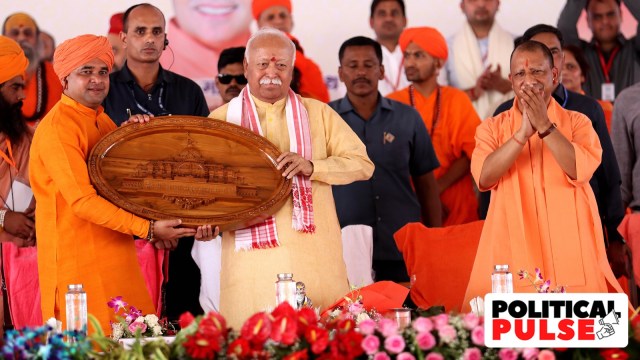Message in a meeting: When Yogi Adityanath, RSS huddled at Mathura, talked Kumbh, Karnataka, common goals
UP CM’s long visit to an RSS meeting and the issues he raised were noticeable for the timing, the ties between the two, and his own national positioning
 According to the RSS, Yogi Adityanath urged them to help with large-scale participation of certain sections of the Hindu society, such as the dominant OBC community of Lingayats in Karnataka, in the Kumbh Mela that is being organised by his government on a grand scale in Prayagraj next year. (Express Archives)
According to the RSS, Yogi Adityanath urged them to help with large-scale participation of certain sections of the Hindu society, such as the dominant OBC community of Lingayats in Karnataka, in the Kumbh Mela that is being organised by his government on a grand scale in Prayagraj next year. (Express Archives)The recent two-day Akhil Bharatiya Karyakari Mandal (ABKM) baithak of the RSS in Mathura had one visitor more noticeable than the others. Uttar Pradesh Chief Minister Yogi Adityanath dropped in for a visit lasting over two hours, where he held talks with top Sangh leaders, including at a closed-door meeting and over lunch, and mingled with workers.
While it is not unusual for a BJP CM to attend an RSS meeting happening in their state, Adityanath’s long presence at the Mathura venue and the issues he raised stood out at a time that Adityanath is under pressure following the BJP’s poor performance in UP in this year’s Lok Sabha polls, and when he has staked his prestige on the nine coming Assembly bypolls in the state.
According to the RSS, Adityanath urged them to help with large-scale participation of certain sections of the Hindu society, such as the dominant OBC community of Lingayats in Karnataka, in the Kumbh Mela that is being organised by his government on a grand scale in Prayagraj next year.
The UP CM said it was important to reach out to these communities as they had either stayed away from such festivals or had “never been invited”.
Sources said that at the 45-minute closed-door meeting with Sangh top brass, Adityanath spoke at length on this. Agreeing with the UP CM’s views, a senior RSS functionary said: “It is an issue that the RSS too has been working on. Communities such as the Lingayats of Karnataka, Karvis of Maharashtra and certain sects in Kerala have stayed away from the Kumbh. No attempt has even been made earlier to get them into the fold. We have been working on it. The Swaminarayan sect would earlier keep away. We got them to the Kumbh last time.”
The RSS leader added: “Yogi ji proposed that if the RSS makes the effort, he will provide administrative support. We agreed.”
While Adityanath has already made space for himself as one of the BJP’s top Hindutva faces, campaigning for the party far and wide and not just UP, it is perhaps his first bid for an outreach to communities beyond his own state – all the better for the building of a national profile.
The Mathura meeting also showed an attempt by Adityanath to nurture a closer relationship with the RSS. One of the suggestions the CM made was that the Sangh use the Kumbh platform to propagate the “Paanch Pran (five vows)” it has announced as part of its centenary year celebrations, ranging from social harmony to environmental protection.
Adityanath did not reach where he has through the Sangh’s institutional framework. Briefly associated with the ABVP in his college days, he belongs to the Hindu Mahasabha’s ideological tradition. The RSS and Hindu Mahasabha have traditionally had differences, despite belonging to the same ideological pool.
It was only during the Ram Temple movement in the 1990s that Adityanath coordinated with the VHP, an RSS arm. He was a valuable addition as the head of the respected Gorakhnath Peeth in Gorakhpur. He was also the founder of an outfit called the Hindu Yuva Vahini, which is now virtually disbanded.
However, his aggression on Hindutva issues and his image of a strict “enforcer of the law” – via encounters or bulldozers – are the qualities among others that have endeared Adityanath to the RSS, with the cadres appreciative of his “decisive actions”.
Senior RSS leaders believe that it is also important for them to engage with Adityanath given that UP has been the most important laboratory of the Hindutva project, and the CM’s actions have fitted in well with those goals.
Calling him “the future”, a senior RSS leader said: “Yogi ji may not be from the Sangh, but he has been closely associated with the Ram temple movement. Anyone who shares our ideology, is ours. The entire nation has accepted him as a Hindutva icon, it sees the future of the ideology in him. Who are we to question the judgment of society?”
RSS sources said that if the Sangh represents organisational strength, the CM complements this with his charismatic political leadership.
Another sign of the closing of the ranks was RSS general secretary Dattatreya Hosabale, while speaking at the Mathura meeting, using the slogan of “Batenge toh katenge (if you get divided, you will be slaughtered)” first raised by Adityanath.
Responding to a question regarding the slogan, which has also surfaced in posters in poll-bound Maharashtra now, Hosabale downplayed it, saying: “Katenge, batenge… a slogan can be anything… The spirit is that if the Hindu society does not remain united, history shows… disaster will strike and our religious institutions will be destroyed… The issue is that if we remain divided on the basis of caste, region and language, ‘toh hum katenge’.”
About Adityanath’s meeting with the Sangh brass, Hosabale said, “Mainly he (the CM) discussed the Kumbh Mela… He requested that people from across the country must come. He said that people from certain sections of the society have not been called for several hundred years and they do not participate… such as the Lingayats… the tribals.”
Adityanath pointed out that Kumbh was not merely a religious event, but also a cultural event that showed national unity, Hosabale said. “We said we will help.”
- 01
- 02
- 03
- 04
- 05































